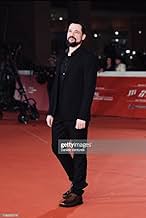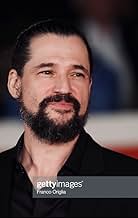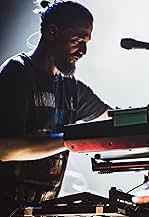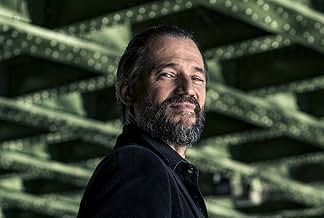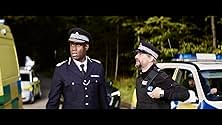Dominique Dauwe
- Actor
- Writer
- Producer
Dominique Dauwe, and the Quiet Revolution of Inclusive Art
For more than two decades, this Belgian-born artist has been at the forefront of transforming how we view inclusion in film, television, and education, by weaving disability, dignity, and empathy directly into the heart of the story. It is not uncommon to say an artist's work "defies categorization." In the case of Dominique Dauwe, the phrase is more than a compliment, it's a fact. The actor, producer, musician, and writer has spent over two decades building a career that transcends traditional boundaries. His work is not confined to the stage or screen. Instead, it stretches into classrooms, community centers, and inclusive film sets, anywhere the definition of who gets to create can be expanded. In an industry often driven by celebrity and spectacle, Dauwe has charted a quieter, more systemic path. He is not simply making space for artists with disabilities. He helps build infrastructures that ensures those artists can be seen, heard, and hired.
A Creative Foundation, Built on Empathy
Dauwe trained as a pianist at The Jazz Studio in Antwerp before a spontaneous audition redirected him to the theater. But it was in East London, working with music programs in underserved schools, where his career truly took shape. There, he encountered special needs education, and a systemic failure to offer artistic opportunities to children with disabilities. He responded by committing to music and sensory programs at inner city London schools, eventually joining the staff of a special needs school in Bethnal Green. It was not a detour. It was a foundation.
Inclusive Art, From the Ground Up
That ethos followed him across the Atlantic, where he embedded himself in inclusive arts collectives such as Young Storytellers (HBO, WB, and Paramount), The Cheshire Project (Showtime) in California, Jabberwocky on Martha's Vineyard, and Zeno Mountain Farm (Hulu) in Vermont. Through these collaborations, he reentered the world of acting, not pursuing individual stardom, but focusing on collaborative efforts to shift industry perspectives and broaden its creative lens. In Becoming Bulletproof (2014), an award winning Showtime documentary filmed at The Cheshire Project & Zeno Mountain Farm, Dauwe appears both in front of and behind the camera. The project followed a mixed-ability cast as they came together to make a Western, a joyful, rough-edged portrait of community and co-creation. The film didn't just advocate for disability inclusion. It modeled it. That framework continued to evolve with Best Summer Ever (2020), a musical that broke barriers with a cast and crew made up largely of disabled talent. Executive produced by Dauwe alongside Hollywood figures like Jamie Lee Curtis, Ted Danson, Mary Steenburgen, and Amy Brenneman, the film premiered at SXSW, won the Final Draft Screenwriters Award, and was praised for its exuberance and authenticity. "It's a film where the leads simply have a disability, with no explanation necessary. All characters are fully realized, just like anyone else."
Art as Advocacy
Dauwe's film credits are as eclectic as they are intentional: Drowning (2019), 605 Adults 304 Children (2019) The Peanut Butter Falcon (2019), Leos Carax's Annette (2021), The Chapel (2023), J'aime La Vie (2023), and the upcoming Heysel 85 (2026). Each one reflects his appetite for storytelling that breaks molds, not just expectations. He's equally at home on television, with appearances in Herrhausen: Der Herr des Geldes (2023), Juliet (2024), Patience (2025), The Couple Next Door (2026), among others. These aren't always disability-centered narratives, but that's precisely the point. Inclusion, for Dauwe, is not a genre. It's a lens. "Inclusion should not be a gesture, but a given and not a gift."
In 2022, he executive produced What's Done Is Done, a poignant music video starring GLOBAL Quincy Jones Award recipients, Jamie Brewer and Zachary Gottsagen. Released on World Down Syndrome Day and premiering at SXSW, the piece was praised for its emotional nuance and for centering a love story rarely seen in mainstream media.
Between Cultures, Between Disciplines
Fluent in English, French, Dutch, and German, Dauwe now splits his time between Ghent (Belgium), Vermont, and Martha's Vineyard (Massachusetts). He works across borders, languages, and genres, yet his focus remains remarkably grounded: to build systems in which inclusion is not a feature, but a foundation. Whether mentoring 5th graders, helping create sensory rooms, or collaborating with mixed-ability crews, Dauwe doesn't seek to be the center of the story. He seeks to change who gets to tell it. Hollywood is still far from truly equitable. But artists like Dauwe are pushing it closer, not through noise, but through quiet, deliberate change. His legacy, still unfolding, is less about star power and more about structural impact, making sure everyone has a seat at the table of pop culture, and all voices are being heard.
For more than two decades, this Belgian-born artist has been at the forefront of transforming how we view inclusion in film, television, and education, by weaving disability, dignity, and empathy directly into the heart of the story. It is not uncommon to say an artist's work "defies categorization." In the case of Dominique Dauwe, the phrase is more than a compliment, it's a fact. The actor, producer, musician, and writer has spent over two decades building a career that transcends traditional boundaries. His work is not confined to the stage or screen. Instead, it stretches into classrooms, community centers, and inclusive film sets, anywhere the definition of who gets to create can be expanded. In an industry often driven by celebrity and spectacle, Dauwe has charted a quieter, more systemic path. He is not simply making space for artists with disabilities. He helps build infrastructures that ensures those artists can be seen, heard, and hired.
A Creative Foundation, Built on Empathy
Dauwe trained as a pianist at The Jazz Studio in Antwerp before a spontaneous audition redirected him to the theater. But it was in East London, working with music programs in underserved schools, where his career truly took shape. There, he encountered special needs education, and a systemic failure to offer artistic opportunities to children with disabilities. He responded by committing to music and sensory programs at inner city London schools, eventually joining the staff of a special needs school in Bethnal Green. It was not a detour. It was a foundation.
Inclusive Art, From the Ground Up
That ethos followed him across the Atlantic, where he embedded himself in inclusive arts collectives such as Young Storytellers (HBO, WB, and Paramount), The Cheshire Project (Showtime) in California, Jabberwocky on Martha's Vineyard, and Zeno Mountain Farm (Hulu) in Vermont. Through these collaborations, he reentered the world of acting, not pursuing individual stardom, but focusing on collaborative efforts to shift industry perspectives and broaden its creative lens. In Becoming Bulletproof (2014), an award winning Showtime documentary filmed at The Cheshire Project & Zeno Mountain Farm, Dauwe appears both in front of and behind the camera. The project followed a mixed-ability cast as they came together to make a Western, a joyful, rough-edged portrait of community and co-creation. The film didn't just advocate for disability inclusion. It modeled it. That framework continued to evolve with Best Summer Ever (2020), a musical that broke barriers with a cast and crew made up largely of disabled talent. Executive produced by Dauwe alongside Hollywood figures like Jamie Lee Curtis, Ted Danson, Mary Steenburgen, and Amy Brenneman, the film premiered at SXSW, won the Final Draft Screenwriters Award, and was praised for its exuberance and authenticity. "It's a film where the leads simply have a disability, with no explanation necessary. All characters are fully realized, just like anyone else."
Art as Advocacy
Dauwe's film credits are as eclectic as they are intentional: Drowning (2019), 605 Adults 304 Children (2019) The Peanut Butter Falcon (2019), Leos Carax's Annette (2021), The Chapel (2023), J'aime La Vie (2023), and the upcoming Heysel 85 (2026). Each one reflects his appetite for storytelling that breaks molds, not just expectations. He's equally at home on television, with appearances in Herrhausen: Der Herr des Geldes (2023), Juliet (2024), Patience (2025), The Couple Next Door (2026), among others. These aren't always disability-centered narratives, but that's precisely the point. Inclusion, for Dauwe, is not a genre. It's a lens. "Inclusion should not be a gesture, but a given and not a gift."
In 2022, he executive produced What's Done Is Done, a poignant music video starring GLOBAL Quincy Jones Award recipients, Jamie Brewer and Zachary Gottsagen. Released on World Down Syndrome Day and premiering at SXSW, the piece was praised for its emotional nuance and for centering a love story rarely seen in mainstream media.
Between Cultures, Between Disciplines
Fluent in English, French, Dutch, and German, Dauwe now splits his time between Ghent (Belgium), Vermont, and Martha's Vineyard (Massachusetts). He works across borders, languages, and genres, yet his focus remains remarkably grounded: to build systems in which inclusion is not a feature, but a foundation. Whether mentoring 5th graders, helping create sensory rooms, or collaborating with mixed-ability crews, Dauwe doesn't seek to be the center of the story. He seeks to change who gets to tell it. Hollywood is still far from truly equitable. But artists like Dauwe are pushing it closer, not through noise, but through quiet, deliberate change. His legacy, still unfolding, is less about star power and more about structural impact, making sure everyone has a seat at the table of pop culture, and all voices are being heard.


